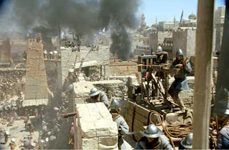Kingdom of Heaven
|  On paper at least, Ridley Scott's Kingdom of Heaven looks like a powder keg lobbed into a burning building. Considering the current global sociopolitical context, making a film about the 12th-century war between Christians and Muslims for control of Jerusalem would seem a strange, if not downright crazy idea. On paper at least, Ridley Scott's Kingdom of Heaven looks like a powder keg lobbed into a burning building. Considering the current global sociopolitical context, making a film about the 12th-century war between Christians and Muslims for control of Jerusalem would seem a strange, if not downright crazy idea.Yet, although not a particularly good movie, Kingdom of Heaven is nothing short of brilliant in the way it dives into the middle of a political-religious morass and still manages to avoid any significant implications. By employing a select few villains whose war mongering has nothing to do with religion and everything to do with simple greed (a sin that cuts across all religious barriers), the film neatly sidesteps the need to take sides. It employs classic Hollywood structure and characterization to divert attention away from any issues that might cause discomfort to viewers, whatever their stripe. Chief among the film's distracting ploys is the main character, Balian (Orlando Bloom), a blacksmith from a small French village. Although modeled on a historical character, screenwriter William Monahan grounds Balian in the familiar hero mode by giving him a traditional character arc in which he begins in the pit of human despair and, through tenacity, decency, and some good ol' fashioned luck, becomes a knight of unquestionable nobility. Kingdom of Heaven marks Bloom's first starring role after supporting parts in the blockbuster Lord of the Rings trilogy and Pirates of the Caribbean: The Curse of the Black Pearl, but he's not quite up to the task. He gained 20 pounds of muscle for the film, but still comes off as something of a lightweight, although this ultimately works in favor of the film's liberal-hearted mantra of brains over brawn, compromise over extremism. After all, this is a film in which the hero turning over the city of Jerusalem to his adversary is declared a major victory (after thousands of people have already been killed, of course). The chilly weather and constantly falling, but never accumulating snow of the film's opening passages set the stage for Balian's despondent state, as his child has just died and his wife committed suicide. Into his village rides Sir Godfrey (Liam Neeson), Balian's long-absent father who has just returned from the first Crusade in the Holy Land. Godfrey invites Balian to return with him to the Holy Land, where he promises not a religious war (Balian has lost his religion anyway), but rather an opportunity to start a new life in a "new world" where he has a chance to make something of himself. That is exactly what Balian does once he reaches Jerusalem, where he becomes a respected and trusted military leader. He aligns the Tiberias (Jeremy Irons), a knight, and Jerusalem's King Baldwin (Edward Norton), the so-called "Leper King" who hid his increasingly disfigured face behind various silver masks (Norton's performance is really quite good considering that he does it almost entirely with his voice and his eyes). Tiberias and King Baldwin are invested in maintaining the fragile peace between Christians, Muslims, and Jews (although the Jews are largely absent from the film), even though Christians control the city. Their main adversary is not Saladin (Syrian actor Ghassan Massoud), the noble Muslim king, but rather a smarmy French prince named Guy de Lusignan (Marton Csokas) and his war-mongering ally, Reynald (Brendan Gleeson). Along the way, Balian finds time to romance King Baldwin's beautiful sister, Sibylla (Eva Green) -- or rather, in an interesting gender twist, she romances him -- who also happens to be Guy's wife. For those without a great deal of knowledge about this particular historical period, some of Kingdom of Heaven will prove trying. It's not so much that it's difficult to follow what's going on; in fact, the various motivations for and against war and the political maneuverings are quite clear-cut, almost to the point of simplification. However, a deep understanding of the historical context would surely make the film a more riveting experience since it is inert on a dramatic level. Much like Oliver Stone's ill-fated Alexander, Kingdom of Heaven gets its historical grandeur down pat, but loses a great deal of the humanity in the process. None of the characters are terribly interesting apart from their historical roles, so the film amounts to little more than a $130 million history lesson. (Almost an hour of the film was supposedly cut out to bring its running time down to a more manageable 145 minutes, so perhaps some of the characterization that would make the film more dramatically involving will be reinserted in the film's DVD release.) In terms of spectacle, Kingdom of Heaven is nothing less than riveting, and Ridley Scott (Gladiator) should be given props for not drowning us in anonymous, massive battles. There is plenty of violence scattered throughout the film, but Scott keeps the big setpiece -- Saladin's siege on Jerusalem -- until the movie's final half hour. He also avoids Stone's mistake of getting so wrapped up in the digitized scope of thousands that he reduces the war to an ant skirmish. Rather, Scott balances the long-range view of the fighting with grisly close-ups and medium shots that actually require real actors. There is one particularly effective extreme high angle shot of the Christian and Muslim armies crushing into each other that works nicely as a visual metaphor for the futility of war. Still, it's hard not to feel like Scott is trying to have it both ways by giving his audience plenty of blood and clanging swords and pile-ups of bodies while perching his film on a precarious ideological branch that proclaims peace, love, and understanding. The film's ultimate message is that wars are not the fault of religious divides, but rather the fault of extremists who use religion as an excuse to justify their own excesses. Thus, while there is a significant critique of religion imbedded in the film, it is not of any one religion. It is a justifiable critique, indeed, yet it sure is convenient how it allows the film to avoid any real controversy except from those who would actively seek it out. Copyright ©2005 James Kendrick Thoughts? E-mail James Kendrick All images copyright ©2005 20th Century Fox |
Overall Rating: 

 (2.5)
(2.5)


